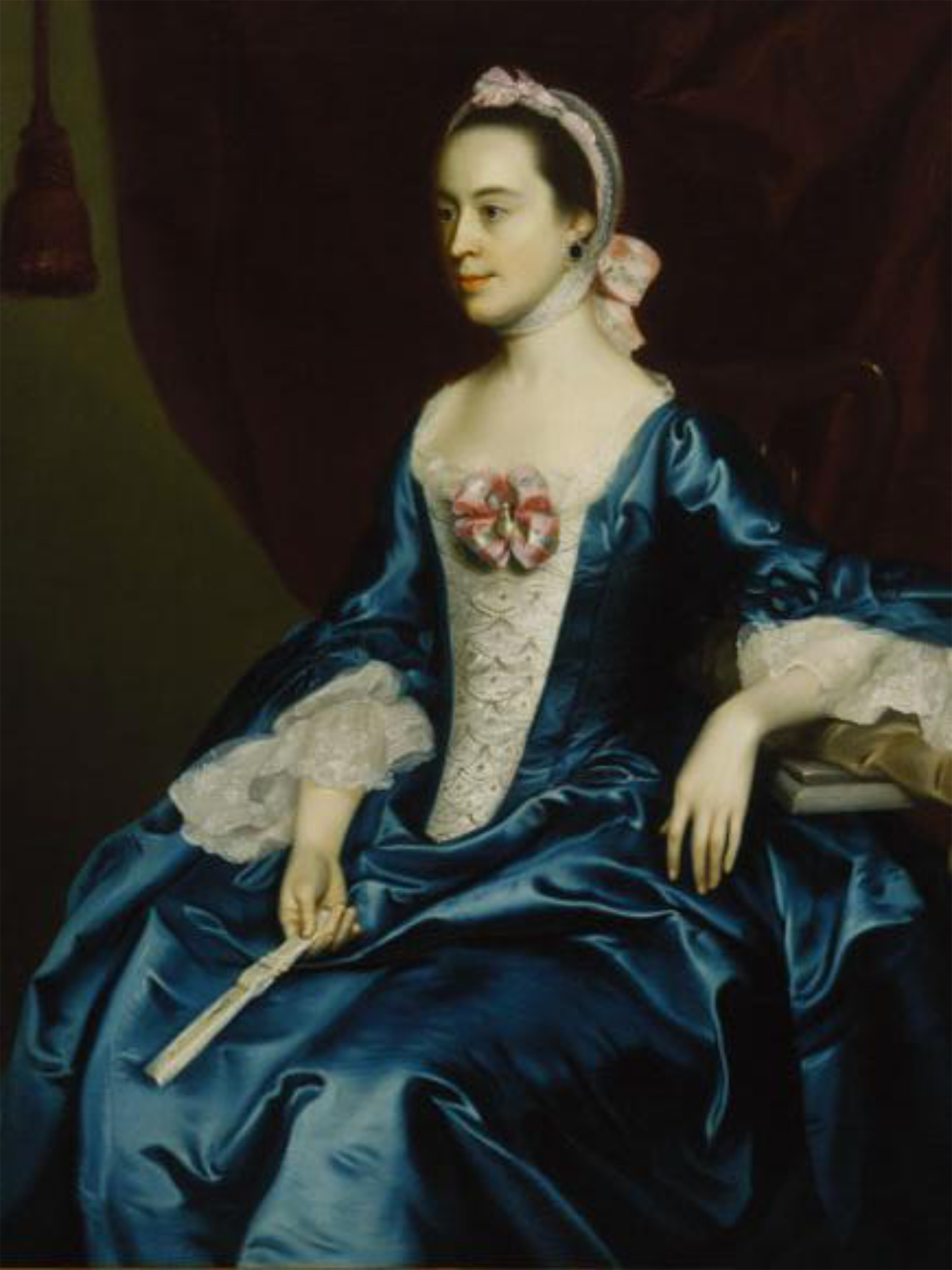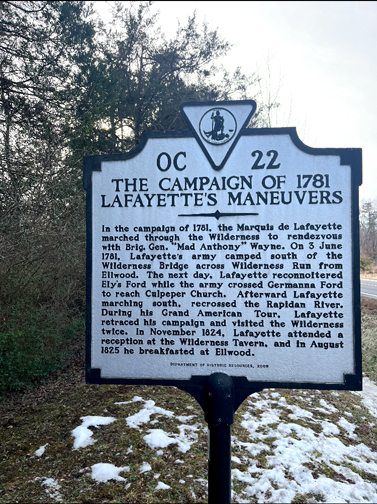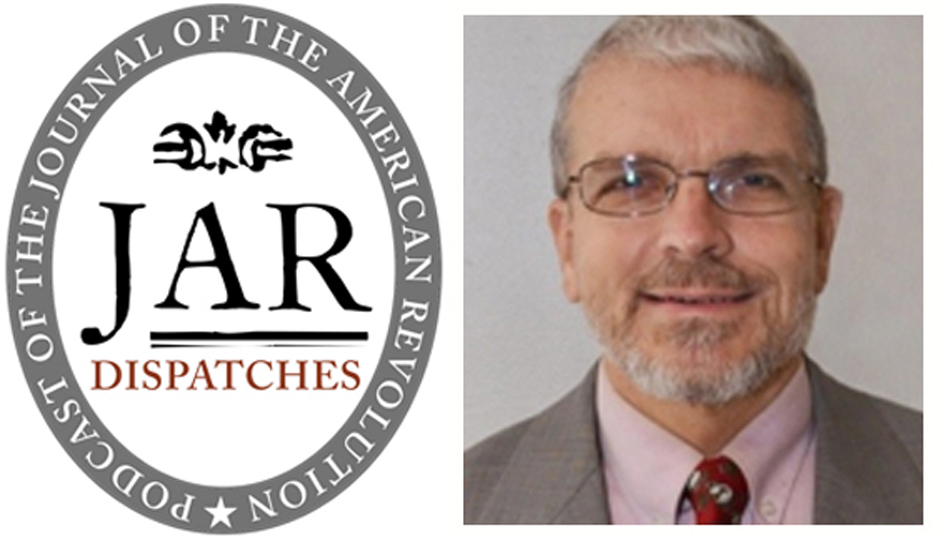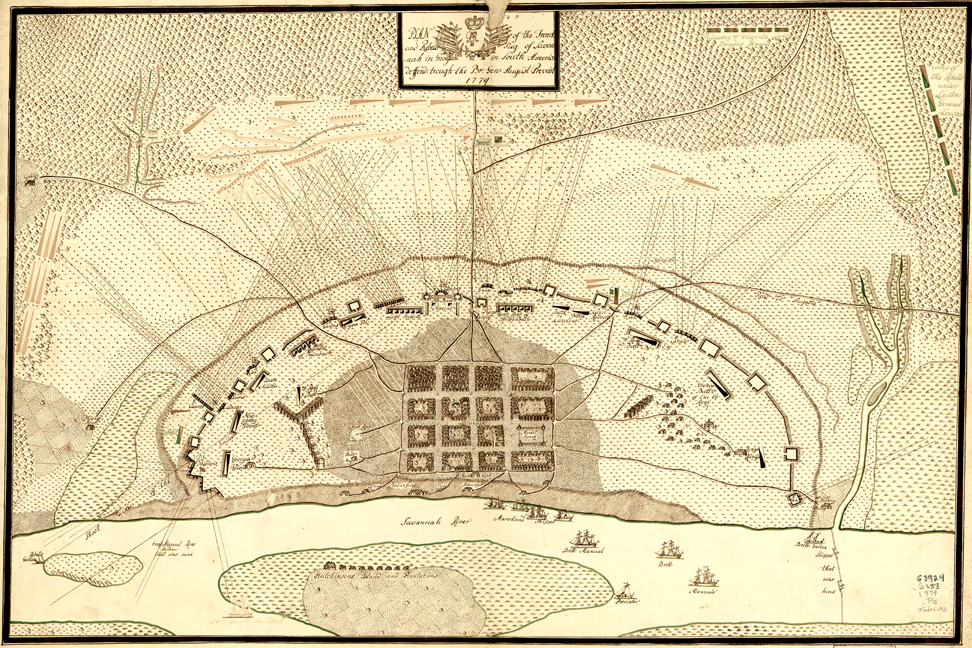
When researching the biography of Revolutionary War hero Dr. Joseph Warren, I had the unexpected pleasure of becoming acquainted with his fiancée Miss Mercy Scollay. Readers of the Journal of the American Revolution may already be familiar with Joseph Warren as the author of the foundational Suffolk Resolves, head of the Massachusetts Committee of Safety who dispatched Paul Revere and William Dawes on the their iconic Midnight Rides, and as the hero of the June 1775 Battle of Bunker Hill. Warren was formerly and justifiably famous at the national level as a charismatic leader who tackled the most vexing problems of his time while colorfully envisioning an aspirational view of America’s future. Mercy Scollay has not yet been recognized as a Daughter of Liberty quite aside from her association with Dr. Warren. Mercy Scollay was unlike any of the young women, including his spouse Elizabeth Hooton Warren (about 1751 – 1773), who had elicited romantic attentions in his past. Beloved Elizabeth, married as a teenager, had given birth to their four children Betsy, Josie, Mary and Dickie, in their brief years together. Elizabeth passed away in the course of a brief illness, perhaps a complication of pregnancy.[1] She left the handsome doctor a widower just as Patriot politics were heating up.
By the Spring of 1774 and a year after Elizabeth’s death, a parade of nubile young women and girls, including the Scollay sisters, passed through Warren’s practice.[2] If one wanted to flirt with Warren, already a prominent public personality in Boston since his 1772 Massacre Oration,[3],[4] a visit to his medical practice afforded opportunities. Dr. Warren’s account books suggest that young women visited his practice unaccompanied. Associated prescriptions suggest that Warren recognized at least some of their complaints were mild and transitory in nature. As Reverend William Gordon, early historian of the American Revolution put it, “The ladies judged him handsome.”[5] Gordon had been personally acquainted with Warren.[6]
Miss Scollay first appeared as Warren’s patient in May of 1774.[7] At 32 she was just a few months younger than Joseph. The daughter of town Selectman and merchant John Scollay, Dr. Warren would have been acquainted with the four Scollay daughters and their father as fellow North Enders and through town political bodies in which both men served.
Hannah Winthrop, Mercy Otis Warren’s friend, thought that Miss Scollay was the author of an intriguing anonymous poem supporting the controversial Solemn League and Covenant.[8] The piece appeared in June of 1774[9] just as the draconian Intolerable Acts were beginning to be forced on Boston in belated British reprisal for the Boston Tea Party. Mrs. Winthrop may have inferred a flirtatious aspect to the anonymous poet’s reveling in female flounces and finery, imagining that the piece was Mercy’s answer to a challenge by the eligible widower Warren. The poem may well have been written by another hand,[10] but it is significant that a notable Massachusetts Daughter of Liberty thought it was Mercy Scollay’s handiwork.
In the satiric poem the author decries the vanity of some women that would lead them to lust after costly imported articles, despite such purchases involving submission to an onerous political agenda, subverting American rights within the British Empire, and putting their men at risk. It is an amusing and ingenious piece despite its weighty context and message. It manages to be flirty, fluffy, erudite, and serious all at once:
“Mira locks up the full dress negligee
And substitutes the careless polanee,
Until some lais just from Britain’s court
A jaunty dress or a newer taste import…
Indulge this trifle, and she asks no more.”
In contrast the author offers herself as possessor of the intelligent charms and virtues of Roman Republican womanhood, the basis for a mature attraction between right minded men and women:
“Or what those modest antiquated charms
That lur’d a Brutus to a Portia’s arms?
Or add the hidden beauties of the mind,
Compar’d to gauze and tassels well combin’d?
In this bles’d age, when such is female worth,
Who fears a Machiavel[li] or guilty [Lord] North?”
If Joseph judged Mercy Scollay was the author, he would have been impressed by her intelligence and political beliefs. A few months later, despite a frenetic period of political turmoil, their relationship had progressed beyond doctor-patient services and acquaintances in the neighborhood. We are left to imagine whether, and to what extent, her “modest antiquated charms” lured Warren’s Brutus to Mercy’s inviting arms.
By mid-April of 1775, Joseph referred to Mercy in private correspondence as ‘family.’ Surviving letters, newly rediscovered by independent scholar and author Derek Beck,[11] reveal that Warren’s children were with Mercy Scollay in Worcester during the earliest part of the Siege of Boston. At that time Joseph Warren was engaged in Cambridge in efforts to organize the machinery of government and transform the militias, whom he called into action on April 19, 1775 as president pro tem of the Massachusetts Provincial Congress and chair of its Committee of Safety, into a sustainable military force.
A number of Patriots and their families fled Boston, some precipitously, following the April 4th arrival by ship of word that Britain would enforce the Port and Massachusetts Government Acts by force or arms, more military troops were coming, and that Patriot leaders could be arrested at will. Warren was one of the Patriots who managed to get his four young children and Mercy out of Boston, inland to Worcester just prior to the outbreak of hostilities.
Mercy Scollay’s father John stayed on in Boston throughout the siege. Mr. Scollay maintained his role as town Selectman, and served as a conduit for communications between Joseph Warren and General Thomas Gage.[12] Many Patriots’ relations, like Samuel Adams’ physician son and Paul Revere’s family, were stranded in the besieged town following the Battles of Lexington and Concord. The occupying British were unwilling to let many escape to their armed compatriots attempting to reclaim the town.
These families frantically sought to get their loved ones out of British-occupied Boston and into the countryside. They hung onto news of Joseph Warren’s indirect negotiations with General Gage to broker the free exit of Patriot Bostonian men, women and children for the entrance of Tory families seeking the protection of the British army in occupied Boston.[13] The fact that these agreements were not honored by the British was the cause of consternation among Patriots and was cited prominently as a grievance against British policies in Continental Congress communications.
Joseph sought a lull in the Siege of Boston to visit Mercy and his children in Worcester. But the disordered state of political and military affairs demanded that he stay close to the action. They never saw each other again. Warren’s interlocking roles as president of the Provincial Congress, chairman or member of the Committees of Safety, Donations and Supplies, and the force of his personality, combined to make him a key person in holding things together in opposing the most powerful army and navy in the world. In addition to his manifold roles, he was newly appointed but not yet confirmed as a fighting major general,[14] just as the freshly reinforced British were endeavoring to break out of Boston. Dr. Warren fought as a common soldier at the ensuing Battle of Bunker Hill, where he was killed in action. His heroics rapidly became the stuff of legend.[15][16]
Mercy was suddenly the unofficial widow in charge of Warren’s four children between the ages of 10 and 2. Overcome with grief, she could hardly function. Her correspondence with John Hancock suggests the depth of her feelings.
“[T]he distress I soon after suffered with any uncertain situation, rendered me for a time incapable of writing or feeling any animating sensations, however the tenderness of good Doctor Dix and his wife [Mercy’s hosts in Worcester] alleviated in some measure my sorrows.”[17]
On her return to Boston in 1776 following the British evacuation, Mercy was still haunted by recollections of Joseph and the places they used to visit:
“The memory of my friend is dearer to me than ever and I take a melancholy pleasure in surveying those places he once animated with his preference.”[18]
Mercy’s later letters to and from John Hancock and Samuel Adams concerned placement of Warren’s orphaned children. She was on friendly terms with these leaders and they recognized her association with Warren.
Mercy’s letters advocating government support for the orphaned Warren children, and for her role in raising them, put her at odds with Warren’s brothers Ebenezer and John, and another family friend of Joseph Warren’s, Mrs. Charles Miller, at whose house eldest child Betsey was staying. Surprising and disappointing to Mercy Scollay was the inaction of Warren’s former associates at the Massachusetts Provincial Congress.[19]
During 1777 Joseph’s youngest brother Dr. John Warren returned to Boston from Continental Army medical service and adopted the orphans the following year. Mercy was relieved of any legal role in the children’s lives, a circumstance leaving her heartbroken.
By 1778 Benedict Arnold, who had briefly met and befriended Warren in the context of the Ticonderoga foray,[20] but had never met Mercy in person, donated five hundred silver dollars via Mercy toward the children’s welfare.[21] In a time of inflation of Continental paper money, this was an impressive gift. Warren’s St. Andrew’s Masonic Lodge, where he had been Grand Master, also stepped up to address some of the orphans’ needs.
Finally, the Continental Congress in 1780 provided for the children by assigning half pay of a Continental major general, retroactive to his untimely demise on Breed’s Hill, to Warren’s children until the youngest would become of age.
Mercy later moved from her parents’ household in Boston to Medfield, Massachusetts, living in the Prentiss household.[22] Mercy’s baby sister Mary Scollay had married Reverend Prentiss in 1790. Mercy may have taught in a grammar school convened for local children by the local pastor.
Miss Scollay never married nor had any children of her own. She lived to age eighty-four, passing away on January 8, 1826.[23] She did not succeed in formalizing her role in the Warren children’s lives. She did, however, keep the issue of their welfare alive within Continental Congress leadership and provided an early precedent for benevolent attention to the survivors of soldiers in the fledgling nation’s service.
I visited her grave on a cold, rainy autumn day in Medfield, Massachusetts, where she is buried in the old section of the Vine Lake Cemetery. The gravesite is rarely, if ever, visited. The nondescript and weathered stone betrays no hint that it marks a true Daughter of Liberty. It is a modest monument covering not only her bones but the unknowable subtleties of a personality and a relationship with a national hero.
There is sadness about the place. I am burdened with the collective loss borne by generations of American women whose men eschewed the warmth of Vesta and of Venus for the steely embrace of Mars. Whether volunteers or draftees, so many have never returned. Mercy was subject to all the hardships of widowhood, but had scant societal sanction, recognition, or support as one never officially married.
A relationship and a life together with Joseph Warren and his children were life experiences she earnestly desired and sincerely missed. Maybe they would have cemented their relationship with a baby of their own.
Had Joseph Warren survived Bunker Hill and the remainder of the war, they would have been a power couple, as we might now label them. Joseph, no longer the neophyte physician, earlier dismissive of women and exhibiting a tendency to Masonic secrecy, would have matured into a battle tested veteran, popular and energized by association with all sorts of people. He was on his way to surpassing his political mentor Samuel Adams for tactical creativity and effective transition from local activist to respected civil and military leader. Mercy, for her part was a dedicated Patriot, well connected among leading politicians, enlivened by religious conviction, informed and articulate concerning issues of the day, and not intimidated by self-important men.
 It is easy to imagine Mercy and Joseph as a united, symbiotic force to be reckoned with in the Early Confederation and Republic’s Massachusetts governor’s mansion. Warren’s friends and associates John Hancock, Samuel Adams, Elbridge Gerry and even his apprentice in medicine William Eustis, all served as state governor at one time or another. Why not Warren too?
It is easy to imagine Mercy and Joseph as a united, symbiotic force to be reckoned with in the Early Confederation and Republic’s Massachusetts governor’s mansion. Warren’s friends and associates John Hancock, Samuel Adams, Elbridge Gerry and even his apprentice in medicine William Eustis, all served as state governor at one time or another. Why not Warren too?
With his extensive contacts across social strata, credibility and personal appeal, would Shay’s Rebellion have played out in the same way if Warren were on the scene? Would Mercy and Joseph one day enter the national stage together and live in the White House? All of this is idle conjecture.
History professors write of the concepts of agency and contingency, or in contrast, the inevitability of impersonal dialectics, economic determinism, or international dynamics of the Atlantic world. Somehow it all comes together as a muddled reality in this mired field of broken dreams.
I bought a yellow rose on the way to the cemetery and lay it on Miss Mercy Scollay’s grave. “This is from Joseph Warren,” I say aloud to no one in particular. “You are remembered.”
(Adapted from the new biography of Dr. Joseph Warren, which includes the most extensive discussion of Miss Mercy Scollay yet in print.)
Note about upper left image: This will be the first time the Lady in a Blue Dress has EVER appeared publicly as Miss Mercy Scollay.
[1] [attributed to Joseph Warren] “Good Send Modesty with Virtue Crown’d,” Boston Gazette, May 3, 1773, Issue 943, Page 3.
[2] Joseph Warren Account Books (1763-1788), Boston: Massachusetts Historical Society, Vol. II entries between April 1774 and February 1775.
[3] Joseph Warren. An Oration Delivered March 5th, 1772. At the Request of the Inhabitants of the Town of Boston; to Commemorate the Bloody Tragedy of the Fifth of March, 1770. 2nd ed. Boston: Edes and Gill, 1772.
[4] “Boston, March 9, 1772.” Connecticut Courant, March 24, 1772, No. 378, p. 4. News coverage of Warren’s Boston Massacre commemorative oration.
[5] William Gordon. The History of the Rise, Progress, and Establishment, of the Independence of the United States of America: Including an Account of the Late War; and of the Thirteen Colonies from Their Origin to That Period. 4 vols. London: Charles Dilly and James Buckland, 1788, Vol. II, pp. 49-50.
[6] William Gordon to Joseph Warren, ms letter dated May 20, 1775. In U.S. Revolution Collection. Worcester, MA: American Antiquarian Society
[8] Hannah Fayerweather Winthrop to Mercy Otis Warren, letter dated September 27, 1774. In Warren-Adams Letters, Boston: Massachusetts Historical Society, Vol. I, p. 33,
[9] “To a Gentleman Who Requested a List of Those Articles Which Female Vanity Has Comprised under the Head of Necessaries.” Royal American Magazine, Boston: Isaiah Thomas publisher, June 1774, pp.233-234. Re-publication years after the Revolutionary War belatedly revealed that Mercy Otis Warren was the author.
[10] Mrs. M[ercy Otis] Warren. Poems, Dramatic and Miscellaneous. Boston: I. Thomas and E.T. Andrews, 1790, pp. 208-212.
[11] Centennial Anniversary of the Declaration of Independence, July 4, 1876, to Which Are Added Historical and Chronologic Notes. Worcester: Press of Chas. Hamilton, 1876; and Catalogue of Autographs, Letters and Historical Documents, Collected by the Late Prof. E. H. Leffingwell, of New Haven, Conn., to Be Sold by Auction Tuesday January 6th, 1891 and Following Days. Boston: C. F. Libbie & Co, 1891. Mr. Beck pieced together texts of missing letters by Joseph Warren from these 19th century secondary sources.
[12] Joseph Warren to John Schollay[sic] extracted by Thomas Gage, ms dated May 17, 1775. In Thomas Gage Papers, English Series, Vol. 29. Ann Arbor, Michigan: Clements Library, University of Michigan
[13] Joseph Warren Esqr to His Excellency Genl Gage, ms letter dated April 20, 1775. In U.S. Revolution Collection. Worcester, MA: American Antiquarian Society
[14] William Lincoln. The Journals of the Provincial Congress of Massachusetts in 1774 and 1775, and the Committee of Safety, with an Appendix, Containing the Proceedings of the County Conventions, Narratives of the Events of April 19, 1775, Papers Relating to Ticonderoga and Crown Point and Other Documents. Boston: Dutton and Wentworth, 1838, p. 333.
[15] Anonymous. “An Eulogium Sacred to the Memory of the Late Major General Warren, Who Fell June 17, 1775, Fighting against the Ministerial Army at Boston” Pennsylvania Magazine, June 1775.
[16] Hugh Henry Brackenridge. The Battle of Bunker’s Hill: A Dramatic Piece of Five Acts, in Heroic Measure. Philadelphia: Robert Bell, 1776.
[17] Mercy Scollay to John Hancock, letter dated May 21, 1776. In John Collins Warren Papers and reel 2 of the John Hancock Family Papers. Boston: Massachusetts Historical Society
[19] Mercy Scollay to Dr. and Mrs. Dix, ms letter dated August 17, 1775. In Mercy Scollay Papers (1775-1824), Cambridge, Massachusetts: Cambridge Historical Society
[20] Benjamin Church “Orders to Benedict Arnold to Take Fort Ticonderoga.” ms dated May 3, 1775. In U.S. Revolution Collection. Worcester, MA: American Antiquarian Society.
[21] Benedict Arnold to Miss Mercy Scollay, letter dated July 5, 1778. Transactions of the Colonial Society of Massachusetts, 1906, Vol. VIII, pp. 234-35.









One thought on “Valentine to Miss Mercy Scollay”
I first read the account of Dr. Forman visiting Ms. Scollay’s grave in his impressive biography of Joseph Warren. I visualized the cold lonely cemetery with a vibrant yellow rose brightening the scene. I heard his words of appreciation float above her grave as he thanked her for the role she played in Dr. Warren’s life and adorned her long forgotten grave. I was moved then and again now in reading this piece. What a wonderful and fitting article to publish on Valentine’s Day. I suggest it be repeated as often as possible each Valentine’s Day to remind us of so many forgotten women and particularly this wonderful women who lived a long life beyond our nation’s independence, but never marrying after the loss of her heroic fiancé. Thank you!